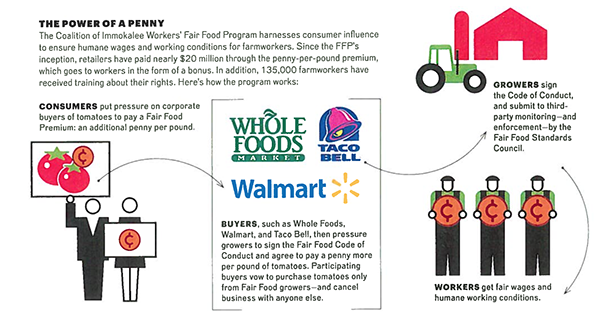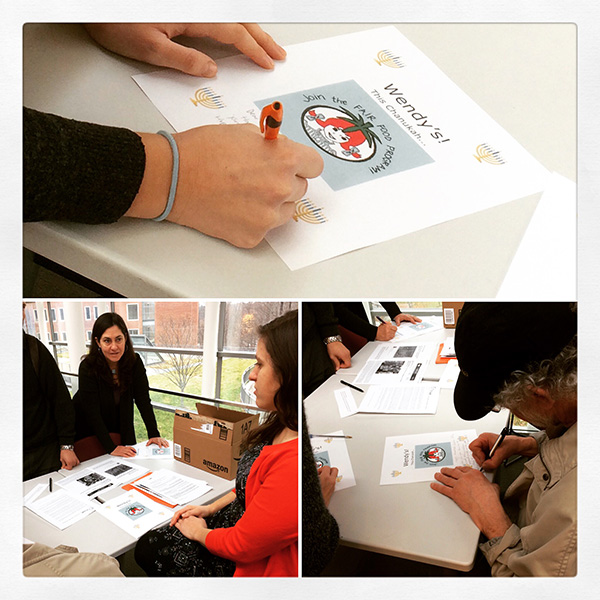Modern Farmer magazine: Fair Food Program uses “smart logic” by creating “an incentive to [do the right thing], and a consequence if you don’t…”
This month, an excellent article by James Beard Award-winning author Tracie McMillan (“The American Way of Eating”) was published in the well-circulated American quarterly magazine, Modern Farmer. Titled “Labor Gains,” the article traces the twenty-year arc of the Fair Food movement and the bright future that lies ahead.
The piece starts off in the 1990s, when Immokalee was “a kind of wild place,” in the words of CIW member Julia de la Cruz. McMillan lays out the generations-old conditions that still persisted at that time in the fields — brutal Florida temperatures without breaks or water, rampant sexual harassment and verbal abuse, “illegally low wages” and in extreme cases, modern slavery — and that prompted workers to join together in search of a systemic solution:
“… in 2001, some CIW members learned that Taco Bell had signed a big contract with a local grower. And the proverbial lightbulb went off: It was the buyers, rather than the growers, who held the real power. What if, the group wondered, they could convince Taco Bell to insist on better conditions for pickers?
CIW organizers banded together with a group of University of Florida students who’d helped with earlier initiatives. College campuses are a prime market for Taco Bell, and the franchise on the university’s grounds was particularly popular. Executives might not listen to the concerns of farmworkers, but they’d probably pay attention once a swath of prized customers complained. The group’s plan, called the Campaign for Fair Food, relied on a simple formula that made perfect sense for kids buying tacos: A penny per pound. If corporate buyers agreed to pay that tiny premium, and the premium went toward wages, workers would in effect, receive a nearly 80 percent raise.
The CIW began to identify possible corporate partners one by one, targeting a chosen company, mobilizing supporters, and slowly winning over the company in question…”
From there the article makes its way to the year 2010, passing quickly through the Campaign for Fair Food’s string of victorious campaigns during the first decade of the new millennium to land squarely in the middle of the current chapter in the movement’s long history, the Fair Food Program:
“… It wasn’t until 2010, when the accumulated pressure persuaded Florida’s tomato growers to sign on to what the CIW named the Fair Food Program, that implementation of the bonus-pay scheme went into effect. Even more important than the money, says labor expert [Janice] Fine are the improvements in conditions on farms, abetted by the CIW’s unique Code of Conduct and regulatory body, the Fair Food Standards Council.
Operating somewhat like a DIY department of labor, health, and safety rolled into one, the FFSC educates workers on their rights in Fair Food fields — rights that are more far-reaching than those guaranteed by law. […]
[…] “The logic of the program is really smart,” says Fine, because “it creates an incentive to [do the right thing], and a consequence if you don’t.”
Signing onto the FFP has given grower Jon Esformes, co-CEO of Sunripe Certified Brands, a renewed confidence in his company’s ability to be a good employer. Just as Esformes follows food-safety regulations despite their cost, he says, he follows the FFP requirements, too. “When you’re talking about people’s safety, dignity, and basic human rights, that’s really non-negotiable.”
The companies that growers like Esformes sell to appreciate the CIW’s depth of expertise. Says Matt Rogers, a buyer for Whole Foods: “A third-party transparency standard is incredibly helpful for our purchasing because it ensures responsible sources. And the cost can be nominal.”
The CIW marked its biggest successes when two of the world’s largest supermarkets, Walmart and Ahold, joined the Program in 2014 and 2015, guaranteeing higher wages for the 30,000 workers in their combined supply chains. (The CIW recently broadened it work to tomato pickers in six additional states.) To date, nearly $20 million has been collected in premium payments and passed on to field-worker throughout the United States…”
Finally, the Modern Farmer article examines the rapid expansion of the Fair Food Program, as well as the Worker-driven Social Responsibility model:
“The FFP continues to expand. Last year a Fair Food label was introduced, which lets shoppers know at the time of purchase if their tomatoes have been picked under fair conditions. The CIW expects to add bell peppers to its certification scheme this season. In the meantime, the organization is helping workers in Vermont build a similar initiative to the FFP for dairies, and sharing the CIW model for “worker-driven social responsibility” with farmers and farmworkers abroad. The Immokalee group has strategized with activists from Ghana, Brazil, and India; discussed campaigns with Moroccan and Chilean growers; and consulted with Mexican farm laborers in Baja California.
“It really is a massive advancement for thousands of workers,” says early organizer [Lucas] Benitez. “This has huge implications.” De la Cruz, for her part, is grateful for the smaller gains. The increase in wages is great, she says, but so are the ways her work life and that of her co-workers has become less stressful. “My friends with kids can walk them to school and then go to work,” she says. “It’s an incredibly beautiful thing.”
And that’s a wrap for the highlights from Modern Farmer, but also make sure to check out the full article here!
A movement that keeps growing…
The gains that farmworkers have won in Florida — and beyond — are truly remarkable… but they are also only the beginning. As McMillan lays out, the Fair Food Program is rapidly expanding, and the Campaign for Fair Food has only continued to grow stronger since farmworkers first teamed up with University students in 2001.
To that point, we want to end with a short, fun note from the front lines of the Campaign! Just this month, those of us in Immokalee welcomed a delegation from T’ruah: The Rabbinic Call for Human Rights for several days of discussion, prayer, and planning — and as always, the delegates from T’ruah took their energy home and channeled it into holiday action. Here below is the quick first-hand report:
After coming back from T’ruah’s Rabbinic Delegation to Immokalee, Florida, Mimi Micner joined with two other former T’ruah Fellows Salem Pearce and Monica Gomery to take action as Rabbinical Students.
During the week of Channukah, they collected Channukah cards for Nelson Peltz, the Jewish major shareholder of Wendy’s, urging Wendy’s to sign onto the Fair Food Program to ensure just living conditions and increased wages for tomato pickers in Immokalee. They collected over 45 cards, helping to make the light of justice shine even more brightly.
Today, the lessons of the 20-year history of the Fair Food movement are unmistakable. Farmworkers will not rest in the pursuit of human rights, dignity, and a better wage that can sustain their families. And 21st century consumers — armed with both a clear view of conditions in the supply chain (thanks to the wonderful new transparency born of the Information Age) and their unique power to demand and achieve change when organized — will not be deterred by the excuses and superficial solutions offered by corporations seeking to avoid real social responsibility.
So Wendy’s, Publix — make sure to stay tuned for what is promising to be a very exciting spring in the Campaign for Fair Food…


